 |
Reports according to Master’s order and rating
| Hong Kong |
| Governing
Society with Loving Care |
By Hong Kong News Group (Originally in English)
The government ♥♥♥♥♥ has stepped up efforts in building a more enlightened society in Hong Kong through embarking on a comprehensive plan to protect the environment, to enforce the smoking and tobacco control policy, and to provide a better health care and housing policy. This program has improved the quality of people’s lives in Hong Kong.
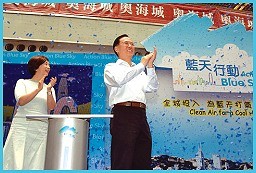 |
Blue Sky Campaign |
The Hong Kong Government has created a series of strategies to control pollution and to protect the environment, including tighter control on vehicle emission, introducing cleaner fuel vehicles, and adopting a sewage strategy to combat water pollution. Hong Kong is now the leading city in Asia to implement vehicle emission control and fuel quality standards. It is also the first city in Asia to introduce ultra-low sulphur diesel fuel for its vehicle fleet.
To combat water pollution, the government’s sewage disposal strategy has commissioned “24 kilometers of large tunnels under the central urban area and a sewage treatment plant at Stonecutters Island,” to “chemically enhance primary treatment for up to 3.5 million cubic meters of flow per day.” (From Living in Hong Kong)
In order to improve the living environment and air quality, on July 25, Golden Year 3 (2006) Chief Executive Mr. Donald Tsang officially launched the Action Blue Sky Campaign, reinforcing the government’s determination to improve Hong Kong’s air quality. “Each small step taken by each individual to support the clean-air in our daily lives can help reduce air pollution,” Mr. Tsang said. Thirty companies and schools also attended the Energy Conservation Center 2006. “Through these publicity and education activities, we hope to gain the full support of the public and the business community, particularly the River Delta Region, in order to achieve our common goal: Clean Air for a Cool Hong Kong,” Mr. Tsang added.
Smoking and Tobacco Control
In order to fulfill the vision of “to promote a smoke-free culture in Hong Kong so as to safeguard the health of the community,” the Legislative Council of the government passed the Smoking (Public Health) (Amendment) Bill 2005 (“the Bill”) into law on October 19, 2006. “With the passage of the bill, the vast majority of indoor areas of workplaces and public places, such as restaurants, offices, schools, hospitals, karaokes and bars which are frequented by people of different ages are required to ban smoking from January 1, Golden Year 4 (2007). Under the new law, all ‘public pleasure grounds’ are designated as no smoking areas.” (From Smoking (Public Health) (Amendment) Bill 2005).
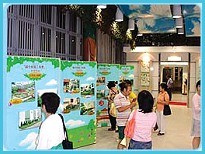 |
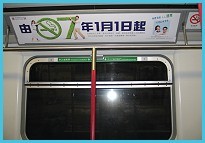 |
| Smoke-Free Exhibition and Green Hong Kong Campaign | |
Also to make known the legislative requirements, the Tobacco Control Office of the Government plans to launch a series of publicity and public education activities, such as announcements in the Public Internet (APIs) or producing television and radio shows, conducting workshops, giving out pamphlets and other educational materials to the public. In addition, the Tobacco Control Office will also promote its tobacco cessation service, and work with the Tobacco Control (Smoke-Free Restaurants) Working Group to publicize the new legislative requirements. In terms of Health Care and Housing Policy: “The aim of the Government’s Health Care Policy is that no one should be denied adequate medical treatment through lack of means.” (From Living in Hong Kong)
Hong Kong people have enjoyed good health, supported by the Family Health Service, the Port Health Service, the Student Health Service, the School Dental Service and many other community health services implemented by the government. These preventive services have contributed to Hong Kong’s remarkable low infant and maternal mortality rates, comparable to the best in the world.
Health Care and Housing
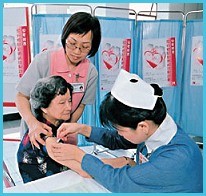 |
| Health Care Project |
The government has created the Public Rental Housing Policy to support families who cannot afford private rental accommodation. There are about 2.14 million people living in public housing. In 2004 and 2005 the government spent 7.4 percent of its total expenditures on the public housing program, which is a major social achievement. “Since 1978, over 423,000 subsidized sole flats have been sold to households of eligible families/persons at discounted prices under the government’s various subsidized home ownership schemes.” (From Living in Hong Kong “Housing”)
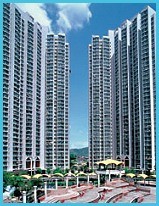 |
| Public Housing Project |
The Hong Kong Government has a long-established
philosophy of “maximum help and minimum interference,” and
is also well known for its efficiency, transparency and fairness. The
government is ready to help people under that philosophy, and determined
to build a better future for Hong Kong. ![]()
| << | Contents | >> |
| Refer
this page to friends |
||